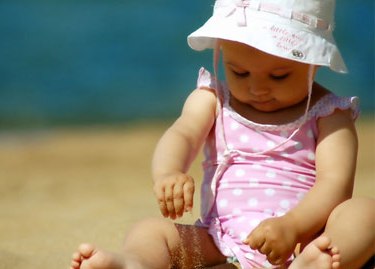Heat strokes a concern on hot summer days

By Sabina Idayatova
We are in the last month of summer, which is a lovely season for most people, but sometimes it could be a dangerous and difficult period for newborn babies from the viewpoint of health adaptation.
Though the month of July was cool enough in Baku, 20 people suffered from sunstroke last month, including children.
According to PhD Huseyn Gabulov, an expert on children's diseases, the number of people seeking medical aid in pediatrics due to the consequences of hot weather dramatically increases during hot summer days, and this summer is not an exception.
Gabulov says that certainly, spending time in the open air is one of the guarantees of good health, however, it is important to remain vigilant on the hottest days especially with respect to children, whose thermoregulatory system is quite unstable and more frequently exposed to fluctuations in the ambient temperature than that of adults.
It should be taken into account that if a child spends a long time under the sun in hot weather, sunstroke or thermal shock can occur, which is quite a dangerous condition that primarily affects the brain, the cardiovascular and respiratory systems as well as other organs of children.
Thermal stroke is a condition caused by overheating as a result of prolonged exposure to high ambient temperature. Thermogenesis processes enhance while simultaneously heat return to the environment decreases, which causes a sharp hyperthermia and as a result, failure of important functions of the human body.
Sunstroke, which is a type of thermal stroke, is the result of direct exposure of sunlight directly to one's head. Both of the above said occur when a child spends a long time in the heat (heat stroke) or under direct sunlight, which leads to malfunction of vital organs.
Thermal stroke is characterized by weakness, body temperature increase to 39-41C°, dizziness, headache, etc. The child may grizzle, refuse to eat. The skin reddens, becomes dry, the pulse accelerates, and the breath shortens. Depending on the severity of the condition nausea, vomiting and diarrhea may develop. Sometimes there are convulsions, nose bleeding, visual disturbances and other symptoms suggestive of lesions of various organs and systems of the affected person.
In case of suspected thermal stroke, ambulance should be called immediately.
As for first-aid, a child should be taken away from the sun and carried to a cool, well-ventilated place, laid on the back with his or her head raised and turned to the side (so that he would not suffocate during possible vomiting), and his clothes should be as light as possible. During hot weather, wipe the kid's body only with a wet towel soaked in water at the room temperature, and give him sips of cool but not cold water. The child should not be forced to drink large quantities of water at once! Tea, coffee and carbonated drinks are not allowed for the injured person!
In order to prevent thermal shock, it is necessary firstly to avoid prolonged exposure of direct sunlight to the baby's bare head or body, to cover his head with a handkerchief or a cap, to alternate bathing with rest on the beach, make sure that the child does not fall asleep in the sun; do not walk for a long time on the hottest days, drink more liquid, especially pure, cool water.
Being outdoors, especially in the sun on hot summer days, is recommended before 10 a.m. and after 6.00 p.m. In this case, the clothes should be light, such as one made of light cotton fabric.
It is important to limit excessive exercise, such as competitions, long trips, etc. Meals should include vegetables and fruits. Fatty foods and meat products should be limited especially in the afternoon and when one plans to stay under the sun.
You should not limit drinking, which should be mainly composed of pure, unsweetened fruit juices, etc.
Also, during the summer season children are most likely to be affected by common summer illnesses like sore throat, colds, fever, etc. Boils, allergies, water-borne diseases, food borne and mosquito borne diseases, and poliovirus are considered to be common summer diseases.
Summer means the school-year is over, children stay at home or spend their time as they want. If your child is feeling fatigued most of the time in summer, do not panic because it can be due to the summer season. It can also be because your child is suddenly free from the tight routine of going to school, and so he is feeling lazy and fatigued too.
However, by taking due precautions, common summer illnesses in children can be prevented.
First of all, attendtion should be paid to the intake of water and nutritious diet in summer. Intake of fresh fruits should be increased. Children should be encouraged to take a minimum of two baths a day to stay cool and infection-free. Cut fruits and food from roadside vendors as well as spicy and fried food should be avoided. Intake of fresh fruits, green vegetables and fresh fruit juices is very useful for children in summer.
Water should be properly purified and free from germs and viruses. A lot of water should be consumed while traveling outdoors with kids. Children should wear light and loose clothes preferrably made of natural fibers.
Moreover, kids should do exercise early in the morning or late evening to avoid exhaustion.
Here we are to serve you with news right now. It does not cost much, but worth your attention.
Choose to support open, independent, quality journalism and subscribe on a monthly basis.
By subscribing to our online newspaper, you can have full digital access to all news, analysis, and much more.
You can also follow AzerNEWS on Twitter @AzerNewsAz or Facebook @AzerNewsNewspaper
Thank you!
